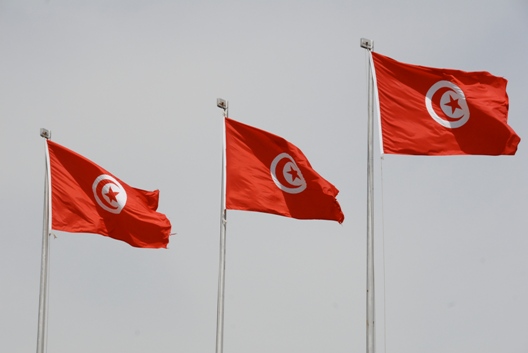 Tunisia has recently celebrated the birth of a new constitution to mark the accomplishment of a major milestone towards democracy. The announcement of the constitution was shortly followed by the inauguration of a new government of independents headed by Mehdi Jomaa to put an end to a political deadlock that polarized the nation and placed the whole democratic transition at risk.
Tunisia has recently celebrated the birth of a new constitution to mark the accomplishment of a major milestone towards democracy. The announcement of the constitution was shortly followed by the inauguration of a new government of independents headed by Mehdi Jomaa to put an end to a political deadlock that polarized the nation and placed the whole democratic transition at risk.
On February 3, President Barak Obama called the newly appointed Tunisian head of government Mehdi Jomaa to congratulate him and to invite him to Washington later this year. Soon after President Obama’s call, US Secretary of State John Kerry made a short unannounced visit to Tunisia where he met Prime Minister Jomaa and Tunisian interim-President MoncefMarzouki to communicate US support for the Tunisian transition to democracy:
The United States has committed more than $400 million in foreign assistance for the transition since 2011 and part of this aid was allocated to a security support program mainly for counterterrorism. This program provided the Tunisian police high quality training and equipment such as a mobile crime lab for police forensics investigations and high-tech vehicles to conduct terrorism investigations.
This is a component of a larger $24 million assistance program ran by the State Department’s Bureau of International Narcotics and Law Enforcement Affairs (INL). It is a relatively significant amount of money within the context of budget spending in Africa.
Two days prior to Kerry’s visit, a group of gunmen sat up a barricade near the north Tunisian-Algerian borders and shot dead two people in a car they stopped and two policemen who later joined the scene. The execution of police officers is a first in Tunisia,but a well-known tactic in the neighboring Algeria.
As the latest in a series of terrorist attacks targeting politicians, police, and military officers, this incident brought the death toll of reported police and military casualties, since 2011, to more than thirty. Authorities, however, have not released publicly any data on the number of terrorists killed during their confrontations with police and military.
Most of these confrontations took place near the Tunisian-Algerian borders, executed by Tunisian and Algerian nationals with close ties to Al-Qaeda in the Islamic Maghreb (AQIM). Regrettably, we have notheard or seen the last of AQIM’s activities in Tunisia.Domestic and regional conditions, and the ease of coordination through social networks, are likely to further facilitate radicalization and terrorism in Tunisia and the region.
Many police officers argue that fighting terrorism was much easier during the ousted dictator ZineEl-Abedine Ben Ali. Public expectations and standard operating procedures changed dramatically after the revolution.Everyone—from politicians to civil society—expect the police to effectively fight terrorism without violating the law or jeopardizing human rights. With neither the training nor the practice to conduct the type of investigation required, however, this paradigm shift disrupts police dynamics and affectsofficer performance. Some interpret these failings as a lack of political will to fight terrorism.
The newly appointed Tunisian government’s main task is to prepare and organize democratic elections later this year, its biggest challenge thus far to maintain security and eliminate terrorism. Insecurity not only threatens the upcoming elections, but also a democratic futureif Tunisians are forced to choose between freedom and security. John Kerry emphasized this point during his Tunisia press conference when he said: “No democracy can survive or prosper in the absence of security.”
The United States is trying to play an active role in putting an end to this threat. Nevertheless, the targeted enemy has active cells throughout the Arab world and Africa, and has already declared war on many countries other than the United States. The United States shouldn’t engage in this fight alone.Instead, a common strategy should be developed where the international partners could participate.
A starting point would be to harmonize the independent efforts by countries such as the Netherlands, Turkey, Qatar, and Germany that are also funding security related projects in Tunisia. Due to the transnational nature of these groups, regional initiatives need to be encouraged as a way to tackle the threat, taking the regional context into consideration.
To ensure sustainability, funding educational and economic projects should go hand in hand with security assistance. Most terrorists share one thing in common: poor socioeconomic status. As such, the fight against terrorism extends beyond the scope of simply training and equipping security forces; It is tightly coupled with finding sustainable economic solutions in unprivileged areas,particularly for marginalized youth who could easily adopt threatening ideologies and find a sense of belonging in terrorist organizations. In his speech, Kerry discussed the $10 million Thomas Jefferson scholarship program for Tunisians.A good start, but not enough.The Tunisian governmentwill require assistance in designing and implementing large-scale, inclusive(but costly) development projectsthat invest in the country’s infrastructure in addition to comprehensive education reform to meet the needs of a changing market should it hope to provide a sustainable democratic future.
Short term strategies such as “train and equip” in partnership with regional and international allies,along with longer-term approaches such as investing in education and economic development will help Tunisia in its democratic transition. If successful, it could evenbe held up as a model for other aspiring democracies. Investing in Tunisia’s fight against terror may seem costly now,but by protecting its nascent democracy now,international partners can prevent the threat of spillover and their own regional interests—and that is priceless.
Bassem Bouguerra is a Tunisian activist, commentator, and the president of the Tunisian Institutional Reform, a non-profit organization currently focused on security sector reform.
Image: (Photo: Wikimedia)
